Category Archive 'John C. Calhoun'
25 Sep 2022


Judith Schiff 1937-2022, Chief Research Archivist, Sterling Library, Yale University.
OK.
The latest Yale Alumni Magazine arrived yesterday. Its key feature article this issue is a tribute to Judith Schiff who had contributed a popular “Old Yale” column to the alumni mag since 1987.
There is nothing wrong with the eulogy to the late archivist in itself. But there were all those little infuriating details that get the blood pressure of an elderly alumn seething.
In the midst of noting the admirable contribution those 219 “Old Yale” columns constituted over the long decades, Alumni Mag editor-in-chief Kathrin Day Lassila ’81 (the ever reliable source of left-wing self gratulation and cant) clocks in to gloat over persuading Ms. Schiff not to omit a pious condemnation of the Pro-Slavery views of John C. Calhoun, Class of 1804, in a column actually discussing Calhoun’s role in leading the House of Representatives in the direction of a Declaration of War against Britain in 1812.
Representatives of the Woke Left, like Ms. Lassila, never overlook any opportunity to point fingers in condemnation at, and to preen in moral superiority over, the errors of persons long dead. How can one possibly say enough about the spiritual magnificence and boundless generosity of members of today’s Community of Fashion in refraining from owning and trafficking in any slaves and their bravery in forthrightly denouncing an institution extinct for over a century and a half and absolutely lacking any current defenders?
Personal Tribute No. 1 comes from a member of the Class of 1971, a transfer who became one of the first female graduates of Yale College, and who “received the Yale Medal for projects highlighting Women and Minorities.” IMHO, there ought to be a much bigger medal for persuading whiny minority identity groups to go away and shut up for a change.
The Schiff article includes several warm personal tributes from Yale functionaries and factotums who were personally acquainted with the lady which are in themselves perfectly fine. However, the faithful reader discovers that Personal Tribute No. 2 is the product of the collaboration of one chap (M.A. 89) who is a “New Haven-based cultural organizer” (a term that inevitably tempts any right-thinking alumn to start reaching for his revolver) and another guy (’87, ’93MDiv) who is the Beinecke Library’s “director of community engagement.” What in hell is a Rare Book Library doing throwing away an annual full-time salary on paying somebody to “engage” the inner-city welfare/criminal class of New Haven? Are gang-bangers, coke dealers, hip-hoppers, and the ever-dwindling actual working class of a ruined rust-bucket small city supposed to have some sort of healthy and legitimate interest in the Gutenberg Bible, Shakespeare’s First Folio, or some really cool manuscripts in Carolingian Miniscule?
Tribute No. 5 is from a member of the Class of 1979, ’84MD, and an adjunct psychiatry prof at Yale, who (inevitably) wrote a book about Yale and the Jewish Question, who tells us Ms. Schiff was a terrific help in researching one whiny identity group issue after another after another. That, of course, is what research universities and research university libraries are really for.
And it goes on and on. “When Judy Schiff went to work at Yale there were no senior women teaching at Yale College and no women undergraduates. There were no women officers in the university.” begins Tribute No. 6.
In Woke University-land and Woke-Alumni-Magazine-land, the entire universe, the entire corpus of human learning, and the whole focus of history is centered upon the amour propre, the grievances, and the glories of the triumphant elite establishment representatives of the sacred ressentiment-based Identity Groups.
It’s not that most articles are bad in themselves. It’s the fact that the rancid, worm’s-eye-view perspective of leftist grievance politics permeates everything and is accompanied by an inevitable associated tone of orthodoxy and dogmatism.
The great minds running Yale these days, and editing its publications, obviously never read John Ruskin:
Of all the insolent, all the foolish persuasions that by any chance could enter and hold your empty little heart, this is the proudest and foolishest,–that you have been so much the darling of the Heavens, and favourite of the Fates, as to be born in the very nick of time, and in the punctual place, when and where pure Divine truth had been sifted from the errors of the Nations; and that your papa had been providentially disposed to buy a house in the convenient neighbourhood of the steeple under which that Immaculate and final verity would be beautifully proclaimed. Do not think it, child; it is not so.
Bang! All over America, you can hear the sound of one more issue of the Yale Alumni Mag flung from the hand of an older male alumn hitting the circular file.
06 Jan 2018
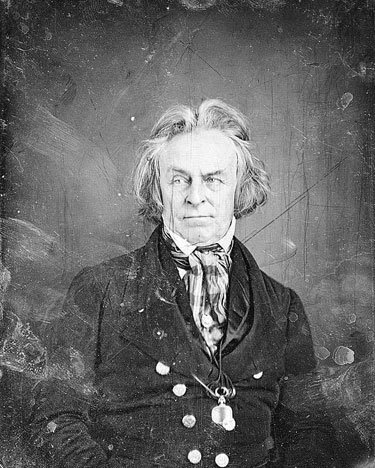
John Caldwell Calhoun, Y’ 1804, 1782-1850.
When the Salovey Administration cravenly surrendered to the snowflakes and renamed Calhoun College. After all, as (Dartmouth man) John Hinderaker notes, even hyper-progressive California is these days drawing upon John C. Calhoun’s theories of Concurrent Majorities and States’ Rights.
Who ever thought that John C. Calhoun would emerge as a key political thinker of the 21st Century? I certainly didn’t, but that is exactly what has happened.
RTWT
15 Nov 2016

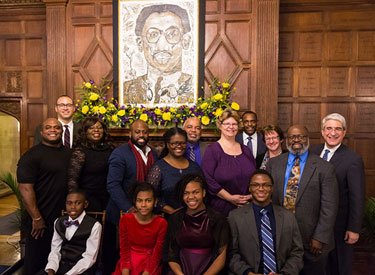
Up at Yale yesterday, they renamed the dining hall of Calhoun College for Roosevelt Thompson, a Yale student of color of the Class of 1984 who got killed in a car crash his senior year.
John C. Calhoun, a non-colored Yale graduate of the Class of 1804, was originally the namesake of the Yale residential college and dining hall which opened in 1933. Calhoun was singled out for that honor on the basis of having been Vice President of the United States, and thus being, as the college’s Wikipedia entry notes, “the only Yale graduate to be elected to a federal executive office in the school’s first two centuries, until the election of U.S. President William Howard Taft in 1909.”
John C. Calhoun served additionally as Secretary of State and Secretary of War. He was elected four times to the House of Representatives, and twice to the U.S. Senate. In the Senate, the strength of his ideas and his rhetorical powers won Calhoun the very exceptional place in History of being traditionally regarded as one of the three all-time giants, along with Daniel Webster and Henry Clay, as the “Great Triumvirate” or the “Immortal Trio,” of that legislative chamber.
John C. Calhoun, beyond his political career, was distinguished as the greatest and most influential writer on Political Philosophy ever produced by Yale. Calhoun was on the losing side of history, as a supporter of Secession and States’ Rights, and as an agrarian defender of Slavery as a benevolent institution and a positive good. His opinions on those issues were defeated on the battlefield, and History has turned the page, but his spirited defense of the rights of minorities to be protected as “concurrent majorities” by limitations on the numerical power of the majority still deserves contemporary consideration and respect.
Roosevelt Thompson is demonstrably considered worthier of (so far, only) Calhoun’s Dining Hall simply on the bases of being born with melanin in his skin, being a popular and successful student, and having died young. Whether the appropriation of John C. Calhoun’s honors at Yale stops with the dining hall remains to be seen. Yale President Peter Salovey mendaciously announced last April that Calhoun College would be keeping its name, then, in late summer, announced the appointment of a “Committee to Establish Principles of Renaming.” Salovey’s Stalinist Renaming Committee is stocked fully with Social Justice Warriors and opponents of hierarchy, Southern Agrarianism, States’ Rights, and John C. Calhoun, so the fix is in.
Yale News
18 Oct 2016

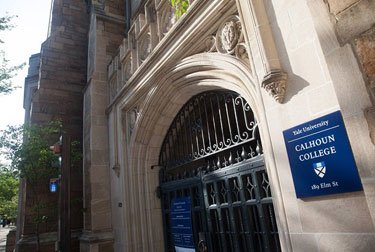
When Yale established the residential college system in emulation of the independent colleges of Oxford and Cambridge, one of the then ten colleges established was named for Class of 1804 alumnus and one-time Vice President, Secretary of State, Secretary of War, illustrious Senator and political theorist John C. Calhoun.
Wikipedia puts it blandly:
Because of his political, military, and intellectual achievements, Calhoun was venerated as an illustrious Yale alumnus beginning in the mid-nineteenth century. He was the only Yale graduate to be elected to a federal executive office in the school’s first two centuries, until the election of U.S. President William Howard Taft in 1909.
But the reality is, Southerner and intellectual father of the Lost Cause though he was, John C. Calhoun, in the era preceding the radical left’s Long March through the Culture and the Universities, was universally regarded as one of the three all-time giants of the Senate, and the single most important American statesman and political thinker to have ever graduated from Yale.
Last April 27th, Yale President Salovey announced that the University was declining to comply with demands from snowflakes of color that Calhoun College be renamed. This rebuff was, however, accompanied by other payoffs: the traditional title of “Master” for the distinguished senior faculty member who presided over a Yale residential college would be henceforward changed to “Head,” lest some dimbulb darkie confusing an ancient academic title with a reference to Antebellum Slavery be offended, and one of the two new residential colleges under construction would be named for some African-American leftist dyke whom no non-communist had ever previously heard of.
The fate of John C. Calhoun’s college seemed to be settled, but, no! it turned out that Salovey was a welsher. Just a few months later, when August rolled around, Salovey announced the formation of an Orwellian “Committee to Establish Principles of Renaming.”
The membership of that committee included a variety of individual SJWs, all obviously keenly committed to contemporary political perspectives intensely hostile to the culture and institutions of the Antebellum Southern United States and passionately opposed to the sectional and anti-egalitarian views of the late Senator Calhoun. There will be found on that committee not one single conservative, one defender of the Southern perspective, one admirer of Calhoun, or even one Old Blue traditionalist. The renaming committee is still currently holding meetings, but to say that its ultimate report is a foregone conclusion would be an massive understatement.
1997 alumnus Alexander Zubatov is the kind of graduate who ought to be in charge, but is not. Zubatov writes indignantly:
[T]he very name, “Committee to Establish Principles on Renaming,†…sounds like something Josef Stalin would have come up with while attempting to whitewash Soviet history of references to tsars, saints and that sort of thing. The act of erecting a one-issue litmus test for whitewashing American universities of references to slavery is equally myopic and dystopian. Undoubtedly, those immersed in the committee’s mission would believe the difference is that they are doing the good Lord’s work in furtherance of a just cause, and yet, wouldn’t they have to concede that Soviets visionaries and bureaucrats surely shared that view?
This nation has become obsessed with race, racism, slavery, discrimination and the cancer of regressive, zero-sum, winner-take-all identity politics, with the result that ideologues on the left and right are ensuring Americans are divided, polarized and pitted against each other based on their most superficial identifications. Yale, like many institutions of higher education in America, appears to have lost sight of the fact that part of the mission of an educational institution should be to avoid trend-hopping and to remain above the fray, to stand back from the dust cloud of our present-day turmoil and avail itself of the more nuanced and distanced vantage points conferred by academic disciplines such as history and philosophy, which further deep reflection rather than shallow proclamations and knee-jerk actions. By contrast, a university that is constantly bobbing and weaving in fear as a response to every whim of impulsive students who have not yet acquired the ability to stand back and think is a university that has lost sight of its educational mission. It is a university being run by spineless technocrats and cynical profiteers afraid of losing a few dollars for a few days on account of being branded “racist†in some hysterical student screed, YouTube video, or viral Tweet.
I have no doubt whatsoever that those who act most rashly today will be judged most harshly by history tomorrow. What we need today is not the renaming of buildings but a re-framing of the entire debate so that the question is not under what conditions we should or should not rename buildings, but rather, why it is that we have come to a point in our culture where so many people have become so over-determined by what Max Weber referred to as their “status groups†(races, gender affiliations, sexual proclivities, etc.) that they are blinded to the common good of our society as a whole.
Read the whole thing and shed a tear for Yale and another for the late Senator from South Carolina.
28 Apr 2016

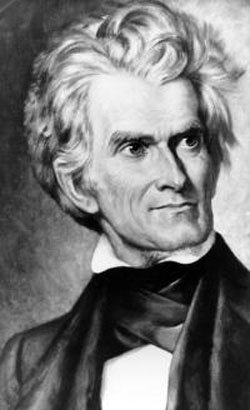
John Caldwell Calhoun; Y’ 1804; Vice President of the United States, 1825-1832; Secretary of State, 1844-1845; Secretary of War, 1817-1825; Senator from South Carolina, 1832-1843 and 1845-1850; Member House of Representatives representing 6th District of South Carolina, 1811-1817; Author, Disquisition on Government (1849), Discourse on the Constitution and Government of the United States (1851); defender of States’ Rights and proponent of the “Concurrent Majority” doctrine holding that minorities ought to have the right in extremis to block majority rule; and member of the all-time Great Triumvirate of the U.S. Senate.
1) Calhoun College stays Calhoun College.
Yale President Salovey announced yesterday afternoon, the Oldest College Daily reported, that the residential college named for Yale’s greatest political thinker and statesman would retain its name, despite John C. Calhoun having held, in the first half of the 19th century, positions on Slavery and inherent Racial Inferiority generally regarded with abhorrence today.
Salovey justified this decision on the part of the Administration and the Corporation, saying:
Removing Calhoun’s name obscures the legacy of slavery rather than addressing it. Erasing Calhoun’s name from a much-beloved residential college risks masking this past, downplaying the lasting effects of slavery and substituting a false and misleading narrative, albeit one that might allow us to feel complacent or, even, self-congratulatory.â€
I suspect that, unreported, unacknowledged, and unsung, somewhere in the decision-making meeting rooms in Woodbridge Hall a dramatic last stand was taken by someone on behalf on history, tradition, and sanity, and that there must have been some terrible threat of a grand financial legacy being withheld were Calhoun’s name to be removed.
——————————–
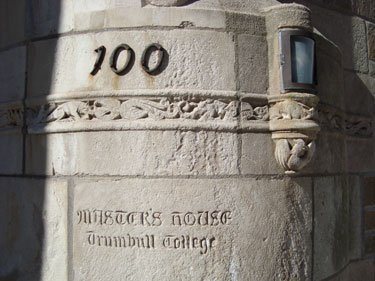
Master’s House, Trumbull College
2) The Title of “Master” of a Residential College Will Be Changed to “Head.”
Salovey wrote:
The use of “master†as a title at Yale is a legacy of the college systems at Oxford and Cambridge. The term derives from the Latin magister, meaning “chief, head, director, teacher,†and it appears in the titles of university degrees (master of arts, master of science, and others) and in many aspects of the larger culture (master craftsman, master builder). Some members of our community argued that discarding the term “master†would interject into an ancient collegiate tradition a racial narrative that has never been associated with its use in the academy. Others maintained that regardless of its history of use in the academy, the title—especially when applied to an authority figure—carries a painful and unwelcome connotation that can be difficult or impossible for some students and residential college staff to ignore.
Among the many comments considered on this matter, the thoughts and recommendations of the current Council of Masters, the twelve heads of the existing residential colleges, were especially salient. The council deliberated at length, informed by a multitude of discussions with students, staff, faculty, and fellows, as well as by reflections submitted to an online site open to all members of each residential college community. The council also monitored similar discussions at other colleges and universities, although its members were determined to arrive at their recommendations bearing in mind Yale’s distinctive traditions and culture.
The council found that making a recommendation to change the title was far from simple. People held a wide range of views, not as strongly correlated as some might have predicted with circumstances of age, race, or position in the college community. Nothing about the term itself is intrinsically tied to Yale’s history prior to 1930, or to the relationships that students of each generation have formed or will form with the individuals who lead their colleges. Moreover, a decision to stop using the term “master†does not compromise the study of larger historical issues. In short, the reasons to change the title of “master†proved more compelling than the reasons to keep it, and the current masters themselves no longer felt it appropriate to be addressed in that manner.
Not incidental to the discussion was the task of finding an alternative title that speaks to the definition and responsibilities of the office. In this respect, “head of college†is the most logical and straightforward choice. In its favor is that archival records show that “head†and “headship†were placeholders for the title in the original planning documents. Heads of college may be addressed as professor, doctor, or Mr. or Ms., as applicable or as they prefer.
Alumni, particularly those of Calhoun College, actually cared about their college’s name being changed. Nobody particularly cared about the Master title, so Master was obviously the perfect sacrifice to fling upon the PC bonfire to appease the mob.
Yalies tend to be pedantic and good at research, so one does wonder why Peter Salovey and his powers-that-be confreres did not trouble themselves to consider “Warden,” “Rector,” or even “President” (as at Magdalen College, Oxford), but instead followed sheepishly along in the lame footsteps of Harvard and Princeton in changing that title to “Head.” It rankles, I think, that the pathetic creature occupying the chair in which John Hersey once sat, set the contemptible policy which the entire set of residential college will be proceeding to follow.
——————————–
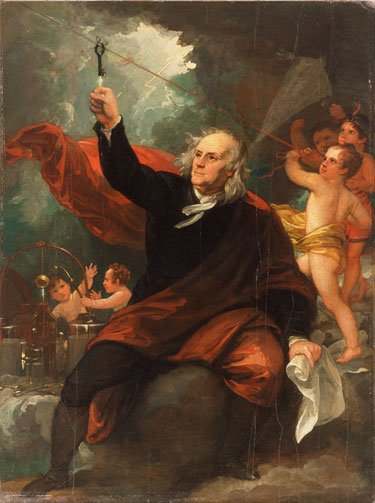
Benjamin West, Benjamin Franklin Drawing Electricity from the Sky, 1816, Philadelphia Museum of Art
3. The new residential colleges will be named for Benjamin Franklin and Pauli Murray (whoever the hell she is).
Peter Salovey explained:
Benjamin Franklin College will recognize the recipient of a Yale honorary degree (1753 Hon. M.A.) whose immense accomplishments span the arts, the sciences, government, and service to society. The 41 published volumes of his papers, which contain the record of Benjamin Franklin’s life correspondence, are among the Yale University Library’s most important collections. The Franklin Papers represent the work of many Yale scholars and editors and, among the historical insights they offer, shed light on Franklin’s relationship with Yale University. He carried on a decades-long correspondence with Yale President Ezra Stiles on subjects ranging from scientific research to the growing collections of Yale’s library.
John Adams, I guess, would have disagreed with this choice. He said of Dr. Franklin, in a 1783 letter to James Warren: “His whole life has been one continued insult to good manners and to decency.â€
But most of us today are nowhere nearly as censorious of Franklin’s illegitimate son and illegitimate grandson or of Franklin’s (1747) The Speech of Polly Baker, defending a fictional woman for bearing illegitimate children.
Franklin’s accomplishments in literature and scientific experiments and as a founder of the United States are so great that nobody could deny his worthiness as the namesake of a college.
The only problem is that he really had no genuine substantive connection to Yale.
Apparently, what really went on here was was explained in a letter from Salovey:
[A]dopting his name for one of the new colleges, we honor as well the generosity of Charles B. Johnson ’54 B.A., who considers Franklin a personal role model. Mr. Johnson’s contribution to enable the construction of the new colleges is the single largest gift made to Yale. Pauli Murray College and Benjamin Franklin College, which will open Yale’s doors to thousands of additional future students, would not have been possible without his philanthropic vision.
Money talks. It isn’t really appropriate, but the man paid for the piper, so he gets to call the tune. It could be worse. We could have a residential college named “Pforzheimer.”
——————————–
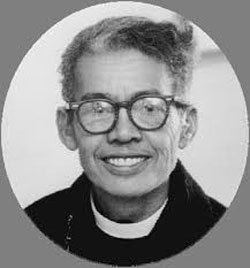
Anna Pauline “Pauli” Murray, Y ’65 J.S.D., ’79 Hon. D.Div., four-fer, maybe five-fer
And, then, of course, we come to the pièce de résistance, the inevitable jolie cadeau de la révolution française, the big, fat chunk of tokenism:
The northern-most college, sited closest to Science Hill, Pauli Murray College will honor a Yale alumna (’65 J.S.D., ’79 Hon. D.Div.) noted for her achievements in law and religion, and for her leadership in civil rights and the advancement of women. Pauli Murray enrolled at Hunter College in the 1920s, graduating in 1933 after deferring her studies following the Great Depression. Later, she began an unsuccessful campaign to enter the all-white University of North Carolina. Murray’s case received national publicity, and she became widely recognized as a civil rights activist.
A graduate of Howard Law School, Murray had an extraordinary legal career as a champion of racial and gender equity. United States Supreme Court Justice Thurgood Marshall cited her book, States’ Laws on Race and Color, for its influence on the lawyers fighting segregation laws. President John F. Kennedy appointed her to the Committee on Civil and Political Rights of the President’s Commission on the Status of Women.
Awarded a fellowship by the Ford Foundation, Murray pursued a doctorate in law at Yale in order to further her scholarly work on gender and racial justice. She co-authored Jane Crow and the Law: Sex Discrimination and Title VII, in which she drew parallels between gender-based discrimination and Jim Crow laws. In 1965, she received her J.S.D. from Yale Law School, the first African-American to do so. Her dissertation was entitled, Roots of the Racial Crisis: Prologue to Policy. Immediately thereafter, she served as counsel in White v. Crook, which successfully challenged discrimination on the basis of sex and race in jury selection. She was a cofounder, with thirty-one others, of the National Organization for Women.
Murray was a vice president of Benedict College in Columbia, South Carolina; she left to become a professor at Brandeis University, where she earned tenure and taught until 1973. She was the first person to teach African-American studies and women’s studies at Brandeis.
The final stage of Murray’s career continued a life marked by confronting challenges and breaking down barriers. At age 63, inspired by her connections with other women in the Episcopal Church, she left Brandeis and enrolled at the General Theological Seminary. She became the first African-American woman ordained as an Episcopal priest..
And you’ve got to hand it to Salovey, the Yale Administration, and the Corporation. When they set out to truckle and to pander to contemporary whiny left-wing identity groups, they do it good and proper. Obviously, in reality, there are no females, there are no African-Americans associated with Yale so eminent or of such accomplishment as to be even close to being genuinely worthy of being the namesake of a Yale College. Hilariously, as well, nobody outside the organized left has ever actually heard of Pauli Murray but, upon looking her up, one finds that, if you are going to pander, she is the cat’s pajamas. Pauli Murray was merely a minor left-wing public nuisance and lived and died in obscurity, but she combines in one small dusky package absolutely everything: she was female, African-American, queer, an Episcopalian priestess, and a transgender wannabee. What a deal! Let’s hope Yale, in future, treats Murray College as its own equivalent of California, and sends all of its commies, fruits, and nuts to go live there at the remote extremity of the campus.
15 Mar 2016

Reason link
—————————
The Yale Administration recently piously removed three portraits of the former Vice President for whom one of Yale’s twelve residential colleges had been named for most of a century. John C. Calhoun’s first-half-of-the-19th-century defense of Slavery has been found to offend the amour propre of Yale students of servile descent, admitted typically on the basis of special favoritism.
02 Sep 2015


John Caldwell Calhoun (1782-1850), Yale Class of 1804, 7th Vice President of the United States 1825-1832.
At the time, in the early 1930s, when Yale was creating the first ten residential colleges, John C. Calhoun was regarded as an inevitable choice for one of their names. Calhoun was only too obviously the single most illustrious statesman and political philosopher to have graduated from Yale.
Eighty-odd years ago, the political conflicts of the 19th century, the contest between Federalism and the Rights of the States, Secession and the American Civil War were viewed dispassionately as past history. Yale President James Rowland Angell was born in Vermont. Neither he not the members of the Yale Corporation of that time are likely to have agreed in the least with John Calhoun on Nullification, Secession, or the benevolence of Slavery, but they all properly regarded those matters as settled and the battles and controversies surrounding them as mere history, unconnected practically or emotionally to their own time.
Naming a Yale residential college for Calhoun simply accorded with a general American recognition of Calhoun as one of the most influential thinkers and most important statesmen in American history. As Richard Hofstader acknowledged, Calhoun was “probably the last American statesman to do any primary political thinking.”
Naming a residential college for John C. Calhoun obviously did not imply that the generally-New-England-bred authorities of that Connecticut University had suddenly converted into Confederate sympathisers. It merely signified their recognition of the accomplishments, personal stature, and historical importance of one of Yale’s most famous graduates. Doubtless, it was also intended, in a minor way, to recognize the national character of the modern university by honoring the champion of the (defeated) Southern section.
It appears, now, that the 21st Century Yale under a newer and more cosmopolitan leadership is about to reverse President Angell’s decision and to reject 80+ years of Yale history by removing the name of John C. Calhoun and renaming his residential college.
President Peter Salovey, last Saturday, welcomed the entering freshman class and announced an “open conversation” on renaming Calhoun College.
We all know what that means. Yale will accede to the loudest, shrillest, most emotionalist, and most radical voices. There will be a narrative about the injured feelings, the wounded sensitivities, of 21st Century African American students. Rational observations will be shouted down, and with complete pomposity and sanctimony President Salovey will express regret, but explain the vital necessity of bowing to contemporary political correctness. Calhoun will be out. His (previously vandalized) stained glass window pulled out and replaced. His name chiseled out of the Gothic sandstone. And you can bet that the college will be renamed, specifically in order to rub it in, for some personage of color, somebody like the world-famous Edward Bouchet, Yale Class of 1874, the first African American to graduate from Yale.
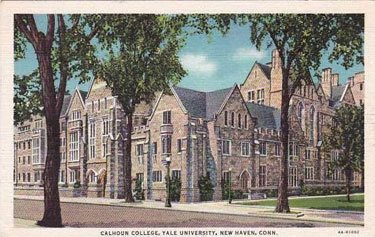
Your are browsing
the Archives of Never Yet Melted in the 'John C. Calhoun' Category.
/div>

Feeds
|














